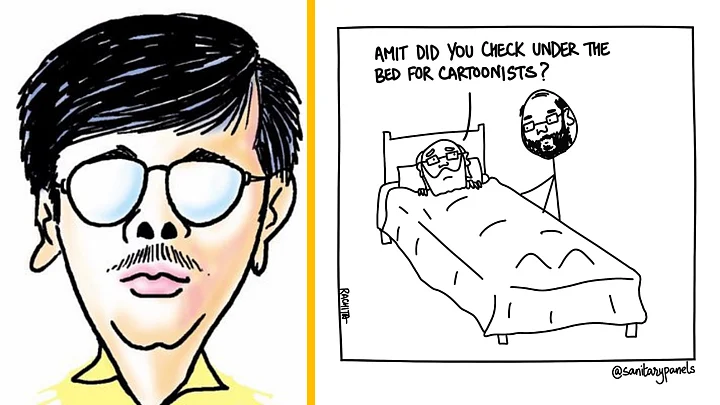In December 2020, Attorney General KK Venugopal gave his consent to initiate contempt proceedings against artist Rachita Taneja, an Indian artist and creator of a social media webcomic called Sanitary Panels.
Neither was it the first time, and as it’s clear now, nor was it going to be the last.
Now, popular political cartoonist Manjul has been informed by Twitter that the social media company has received a legal request from Indian law enforcement to take action against his account.
The cartoonist has posted several illustrations criticising the Centre’s handling of the COVID outbreak, exposing the grim reality of the devastating second wave of the pandemic and how several people did not have access to healthcare.
As the controversy brews, The Quint asked other political cartoonists like Taneja about the government’s action against them in India.
“Manjul ji has always made hard-hitting, impactful comics that hold truth to power. Recently his work has called out the government’s absolute apathy towards Indians during a devastating time,” Taneja said.
“This move by the government attempting to silence Manjul ji is a clear example of the fact that the government has shown no interest in fixing the problem. Instead, they only try to manage their image by shutting down voices that question them.”Rachita Taneja, Webcomic
Taneja started her webcomic in 2014 and has covered a wide range of socio-political issues, including gender, religion, and constitutional rights through her art.
“Political cartoonists hold a mirror to authority. In a healthy democracy, the more power one holds, the more their actions should be scrutinised,” she added.
‘We Don’t Have Any Personal Issues’
Another political cartoonist Bala, who’s faced legal action against his cartoon in the past, added, “It’s common for the Modi bhakts to report any cartoon or content we, for example, Manjul or me, post about the government.”
“We don’t have a personal vendetta against the Prime Minister, but he’s at the Centre and that’s why we make these cartoons. The seat that he’s on, the Prime Minister’s seat, is the reason we criticise him. Consider DMK Karunanidhi or Stalin, whoever it may be, they are/were in a position of power. And that’s the reason for criticism because we don’t have any personal issues.”Bala, Political Cartoonist
In 2017, Bala was arrested for defaming the then Tamil Nadu Chief Minister E Palaniswami in a caricature he had posted online. In his cartoon, the cartoonist had questioned the state government’s inability to prevent a family from self-immolation outside the Tirunelvelli Collectorate office. A labourer, his wife and two children had allegedly taken the tragic step due to increasing harassment from a moneylender.
The judgment for the case against Bala came recently on 19 April.
“The police has no right to register the case and investigate without prior permission, under Section 152 of CrPC. The FIR has been filed against the accused’s freedom of thought and expression, which has been granted to the citizens under Article 19(1) of the Citizens of India,” read the court order.
“By intimidating cartoonists, journalists, or social workers, they are trying to intimidate the general public. They send a message to the public that says, ‘Look we’ve arrested a cartoonist or a journalist’. When such news flashes, they send a message that says that they can arrest anyone so the public should keep quiet.”Bala, Political Cartoonist
But how does it hamper their work?
“The Prime Minister’s supporters usually have WhatsApp or Telegram groups with approximately 5,000 people in each (wherever possible) and they just text in those groups to report a certain account. Now Twitter and Facebook are automated; they don’t know if the account is of a cartoonist or anybody else. They just see that multiple people have reported it and they block it,” Bala explains.
If they report it on Twitter or Facebook for being against community guidelines, we could get blocked for some months. I have been blocked by Facebook for four months. If I post anything, my account will be deactivated,” Bala told The Quint.
Twitter’s Action
Twitter’s notice to Manjul wasn’t an isolated incident. Recently, Twitter withheld approximately 250 accounts at the government’s request for posting information related to the farmers’ protests. These accounts also included those of journalists and media organisations like Caravan.
The e-mail sent to Manjul by Twitter read,
“We understand that receiving this type of notice can be an unsettling experience. While Twitter is not able to provide legal advice, we want you to have an opportunity to evaluate the request and, if you wish, take appropriate action to protect your interests.”
Concerning appropriate action, Twitter suggested that Manjul seek legal counsel and challenge the request in court or contact civil society organisations. The site also suggested that the content could be deleted voluntarily.
In February 2021, the Centre came up with new IT Rules that many believe endanger the freedom of speech and expression granted to all citizens by the Constitution.
In late May, Twitter received a notice from the government after BJP spokesperson Sambit Patra’s tweet about an alleged COVID-19 “toolkit” by Congress was flagged as ‘manipulated media’. Twitter offices were later raided in Delhi and Gurgaon.
